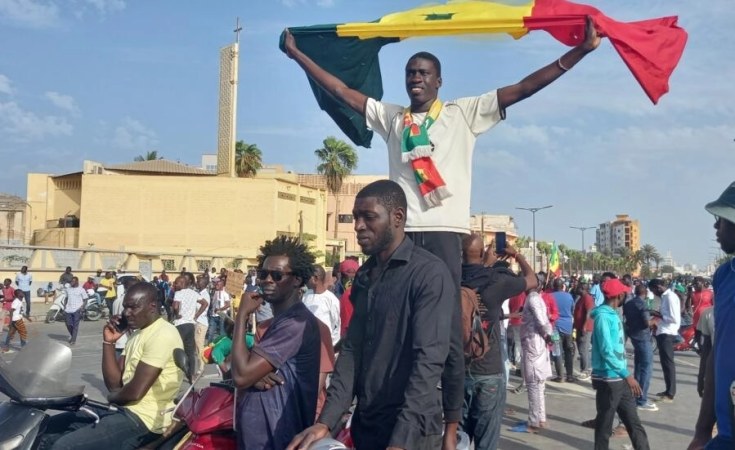Senegal's parliament voted Monday to delay the West African nation's presidential election till Dec. 15 in a chaotic voting process that took place after security forces broke up an opposition attempt to block the vote -- and forcefully removed those lawmakers from the legislative building.
Also on Monday, two opposition candidates filed legal challenges against President Macky Sall's decision to postpone the Feb. 25 election.
One of the provisions of the election delay bill, adopted by the National Assembly, means that Sall's tenure -- due to end on April 2 -- will be extended until the new election is held.
Sall had announced in July that he would not seek a third term in office.
The African Union urged Senegal's government to organize the election "as soon as possible" and urged the opposition candidates "to resolve any political dispute through consultation, understanding and civilized dialogue."
Protests erupted outside the parliamentary building Sunday. Security forces fired tear gas while protesters burned tires, blocked roads and chanted "Macky Sall dictator." Several people were arrested, together with two opposition candidates, including former Prime Minister Aminata Toure, who were later released.
Political stability in Senegal has been fragile for almost a year after authorities cut internet access in June 2023 when supporters of a disqualified opposition leader clashed with security forces.
This is the first time in Senegal's history that a presidential election has been postponed. Opposition leaders have condemned Sall's call for a delay as a "coup."
Experts worry that the electoral delay "reflects a sharp democratic decline" in Senegal, said Mucahid Durmaz, a senior analyst at global risk consultancy Verisk Maplecroft.
"The growing democracy deficit not only threatens to tarnish Senegal's reputation as a beacon of democratic stability in the region but also emboldens anti-democratic practices in West Africa," Durmaz told the Associated Press.
Senegal is often lauded for its stability in the West African region. It has not experienced a coup since its independence from France in the 1960s. However, reactions in response to the recent protests have not sparked confidence in the country's ability to maintain political and economic stability. Senegal's sovereign dollar bonds have fallen sharply.
On Monday, the Senegal government also restricted mobile internet access.
And the private Walf television network, whose signal was cut off during a broadcast of Sunday's protests, managers said their broadcasting license was revoked.
"The government's abrupt shutdown of internet access via mobile data and Walf TV's broadcasting ... constitutes a blatant assault on the right to freedom of expression and press rights protected by Senegal's constitution," Amnesty International's regional office for West and Central Africa said in a statement.
The Ministry of Communication, Telecommunications and Digital Economy defended the decision, and said mobile internet services were cut Monday "due to the dissemination of several hateful and subversive messages relayed on social networks in the context of threats and disturbances to public order."
Human Rights Watch has warned Senegal about the possibility it could lose its democratic label.
"Senegal has long been considered a beacon of democracy in the region. This is now at risk," it said in a statement.
"Authorities need to act to prevent violence, rein in abusive security forces, and end their assault on opposition and media. They should respect freedom of speech, expression, and assembly, and restore internet, putting Senegal back on its democratic course."
Some information for this report was provided by The Associated Press, Agence France-Presse and Reuters.


